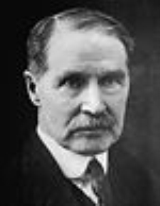
Leaders of the Conservative Party
Encyclopedia
The Leader of the Conservative Party is the most senior politician within the Conservative Party
in the United Kingdom
. The post is currently held by David Cameron
, who s eeded Michael Howard
in 2005
, and who since 2010 is also the serving Prime Minister
.
or a former Prime Minister, or if a particular crisis (as in 1846–1847 or 1916) had resulted in one clearly asserting authority over the other. In the periods when this was not the case (1881–1885, 1911–1916, 1921–1922) there was no clear "Leader of the Conservative Party"—this contributed to some of the internal party conflict at the time. The distinction of the leaders is often overlooked by many and there are lists in circulation that assume the eventual single leader who emerged after a period of coequal leadership was the leader from the outset. However this was not always the case—for example in 1881 it was widely expected that the Commons leader Sir Stafford Northcote would be the next Conservative Prime Minister
, but by the time the party had returned to government in 1885 political developments had resulted in the Lords leader Robert Arthur Talbot Gascoyne-Cecil, 3rd Marquess of Salisbury having the stronger claimant for the premiership.
When the Parliament Act 1911
reduced the power of the Lords, it seemed likely that the leader in the Commons would be preeminent. But that was not formally recognised for another eleven years, and there were several occasions when members of the Lords were strongly considered for the leadership of the whole party after this time. Since 1922 an overall leader has been formally elected by a joint meeting of MPs, peers, and prospective parliamentary candidate
s, even when the party is in opposition. Until 1965 this election was a rubber-stamp
for the individual who had already been asked by the monarch to form a government; the leadership did not fall vacant at any time when the party was in opposition during this period. Since 1965 a succession of ballots have been held in to choose between competing candidates. This was instigated by Alec Douglas-Home
in 1964 after the confused circumstances of his own elevation in 1963.
Conservative Party (UK)
The Conservative Party, formally the Conservative and Unionist Party, is a centre-right political party in the United Kingdom that adheres to the philosophies of conservatism and British unionism. It is the largest political party in the UK, and is currently the largest single party in the House...
in the United Kingdom
United Kingdom
The United Kingdom of Great Britain and Northern IrelandIn the United Kingdom and Dependencies, other languages have been officially recognised as legitimate autochthonous languages under the European Charter for Regional or Minority Languages...
. The post is currently held by David Cameron
David Cameron
David William Donald Cameron is the current Prime Minister of the United Kingdom, First Lord of the Treasury, Minister for the Civil Service and Leader of the Conservative Party. Cameron represents Witney as its Member of Parliament ....
, who s eeded Michael Howard
Michael Howard
Michael Howard, Baron Howard of Lympne, CH, QC, PC is a British politician, who served as the Leader of the Conservative Party and Leader of the Opposition from November 2003 to December 2005...
in 2005
Conservative Party (UK) leadership election, 2005
The 2005 Conservative leadership election was called by party leader Michael Howard on 6 May 2005, when he announced that he would be stepping down as leader in the near future. However, he stated that he would not depart until a review of the rules for the leadership election had been conducted,...
, and who since 2010 is also the serving Prime Minister
Prime Minister of the United Kingdom
The Prime Minister of the United Kingdom of Great Britain and Northern Ireland is the Head of Her Majesty's Government in the United Kingdom. The Prime Minister and Cabinet are collectively accountable for their policies and actions to the Sovereign, to Parliament, to their political party and...
.
Background
Until 1922, there was no formal "Leader of the Conservative Party". There was a leader of the Conservative party in each of the two Houses, and they were regarded as coequal unless one of them was either the Prime MinisterPrime Minister of the United Kingdom
The Prime Minister of the United Kingdom of Great Britain and Northern Ireland is the Head of Her Majesty's Government in the United Kingdom. The Prime Minister and Cabinet are collectively accountable for their policies and actions to the Sovereign, to Parliament, to their political party and...
or a former Prime Minister, or if a particular crisis (as in 1846–1847 or 1916) had resulted in one clearly asserting authority over the other. In the periods when this was not the case (1881–1885, 1911–1916, 1921–1922) there was no clear "Leader of the Conservative Party"—this contributed to some of the internal party conflict at the time. The distinction of the leaders is often overlooked by many and there are lists in circulation that assume the eventual single leader who emerged after a period of coequal leadership was the leader from the outset. However this was not always the case—for example in 1881 it was widely expected that the Commons leader Sir Stafford Northcote would be the next Conservative Prime Minister
Prime minister
A prime minister is the most senior minister of cabinet in the executive branch of government in a parliamentary system. In many systems, the prime minister selects and may dismiss other members of the cabinet, and allocates posts to members within the government. In most systems, the prime...
, but by the time the party had returned to government in 1885 political developments had resulted in the Lords leader Robert Arthur Talbot Gascoyne-Cecil, 3rd Marquess of Salisbury having the stronger claimant for the premiership.
When the Parliament Act 1911
Parliament Act 1911
The Parliament Act 1911 is an Act of the Parliament of the United Kingdom. It is constitutionally important and partly governs the relationship between the House of Commons and the House of Lords which make up the Houses of Parliament. This Act must be construed as one with the Parliament Act 1949...
reduced the power of the Lords, it seemed likely that the leader in the Commons would be preeminent. But that was not formally recognised for another eleven years, and there were several occasions when members of the Lords were strongly considered for the leadership of the whole party after this time. Since 1922 an overall leader has been formally elected by a joint meeting of MPs, peers, and prospective parliamentary candidate
Prospective parliamentary candidate
Prospective parliamentary candidate is a term used in British politics to refer to candidates selected by political parties to fight individual constituencies in advance of a general election. This terminology was motivated by the strict limits on the amount of expenses incurred by an actual...
s, even when the party is in opposition. Until 1965 this election was a rubber-stamp
Rubber stamp (politics)
A rubber stamp, as a political metaphor, refers to a person or institution with considerable de jure power but little de facto power; one that rarely disagrees with more powerful organs....
for the individual who had already been asked by the monarch to form a government; the leadership did not fall vacant at any time when the party was in opposition during this period. Since 1965 a succession of ballots have been held in to choose between competing candidates. This was instigated by Alec Douglas-Home
Alec Douglas-Home
Alexander Frederick Douglas-Home, Baron Home of the Hirsel, KT, PC , known as The Earl of Home from 1951 to 1963 and as Sir Alec Douglas-Home from 1963 to 1974, was a British Conservative politician who served as Prime Minister of the United Kingdom from October 1963 to October 1964.He is the last...
in 1964 after the confused circumstances of his own elevation in 1963.
Leaders in the House of Lords 1834–present
Those asterisked were considered the overall leader of the party.- Arthur Wellesley, 1st Duke of WellingtonArthur Wellesley, 1st Duke of WellingtonField Marshal Arthur Wellesley, 1st Duke of Wellington, KG, GCB, GCH, PC, FRS , was an Irish-born British soldier and statesman, and one of the leading military and political figures of the 19th century...
1834–1846 - Edward Smith-Stanley, 1st Baron StanleyEdward Smith-Stanley, 14th Earl of DerbyEdward George Geoffrey Smith-Stanley, 14th Earl of Derby, KG, PC was an English statesman, three times Prime Minister of the United Kingdom, and to date the longest serving leader of the Conservative Party. He was known before 1834 as Edward Stanley, and from 1834 to 1851 as Lord Stanley...
(14th Earl of Derby from 1851) 1846–1868* - James Howard Harris, 3rd Earl of MalmesburyJames Howard Harris, 3rd Earl of MalmesburyJames Howard Harris, 3rd Earl of Malmesbury GCB, PC , styled Viscount FitzHarris from 1820 to 1841, was a British statesman of the Victorian era.-Background and education:...
1868–1869 - Hugh Cairns, 1st Baron CairnsHugh Cairns, 1st Earl CairnsHugh McCalmont Cairns, 1st Earl Cairns PC, QC was a British statesman who served as Lord Chancellor of the United Kingdom during the first two ministries of Benjamin Disraeli. He was one of the most prominent Conservative statesmen in the House of Lords during this period of Victorian politics...
1869–1870 - Charles Gordon-Lennox, 6th Duke of RichmondCharles Gordon-Lennox, 6th Duke of RichmondCharles Henry Gordon-Lennox, 6th Duke of Richmond, 6th Duke of Lennox, and 1st Duke of Gordon KG PC , styled Lord Settrington until 1819 and Earl of March between 1819 and 1860, was a British Conservative politician.-Background and education:Born at Richmond House, London, he was the son of Charles...
1870–1876 - Benjamin Disraeli, 1st Earl of BeaconsfieldBenjamin Disraeli, 1st Earl of BeaconsfieldBenjamin Disraeli, 1st Earl of Beaconsfield, KG, PC, FRS, was a British Prime Minister, parliamentarian, Conservative statesman and literary figure. Starting from comparatively humble origins, he served in government for three decades, twice as Prime Minister of the United Kingdom...
1876–1881* - Robert Arthur Talbot Gascoyne-Cecil, 3rd Marquess of Salisbury 1881–1902 (overall leader from 1885)
- Spencer Cavendish, 8th Duke of DevonshireSpencer Cavendish, 8th Duke of DevonshireSpencer Compton Cavendish, 8th Duke of Devonshire KG, GCVO, PC, PC , styled Lord Cavendish of Keighley between 1834 and 1858 and Marquess of Hartington between 1858 and 1891, was a British statesman...
1902–1903 - Henry Petty-Fitzmaurice, 5th Marquess of LansdowneHenry Petty-FitzMaurice, 5th Marquess of LansdowneHenry Charles Keith Petty-Fitzmaurice, 5th Marquess of Lansdowne, KG, GCSI, GCMG, GCIE, PC was a British politician and Irish peer who served successively as the fifth Governor General of Canada, Viceroy of India, Secretary of State for War, and Secretary of State for Foreign Affairs...
1903–1916 - George Nathaniel Curzon, 1st Earl Curzon of Kedleston (1st Marquess Curzon of Kedleston from 1921) 1916–1925
- James Gascoyne-Cecil, 4th Marquess of SalisburyJames Gascoyne-Cecil, 4th Marquess of SalisburyJames Edward Hubert Gascoyne-Cecil, 4th Marquess of Salisbury, KG, GCVO, CB, PC , known as Viscount Cranborne from 1868 to 1903, was a British statesman.-Background and education:...
1925–1931 - Douglas Hogg, 1st Viscount HailshamDouglas Hogg, 1st Viscount HailshamDouglas McGarel Hogg, 1st Viscount Hailsham PC was a British lawyer and Conservative politician.-Background:...
1931–1935 - Charles Vane-Tempest-Stewart, 7th Marquess of LondonderryCharles Vane-Tempest-Stewart, 7th Marquess of LondonderryCharles Stewart Henry Vane-Tempest-Stewart, 7th Marquess of Londonderry, KG, MVO, PC, PC , styled Lord Stewart until 1884 and Viscount Castlereagh between 1884 and 1915, was an Anglo-Irish peer and had careers in both Irish and British politics...
1935 - E. F. L. Wood, 3rd Viscount HalifaxE. F. L. Wood, 1st Earl of HalifaxEdward Frederick Lindley Wood, 1st Earl of Halifax, , known as The Lord Irwin from 1925 until 1934 and as The Viscount Halifax from 1934 until 1944, was one of the most senior British Conservative politicians of the 1930s, during which he held several senior ministerial posts, most notably as...
1935–1938 - James Stanhope, 7th Earl StanhopeJames Stanhope, 7th Earl StanhopeJames Richard Stanhope, 13th Earl of Chesterfield and 7th Earl Stanhope KG, DSO, MC, PC , styled Viscount Mahon until 1905, and known as The Earl Stanhope from 1905 until 1967, was a British Conservative politician.-Background:Stanhope was the eldest son of Arthur Stanhope, 6th Earl Stanhope, and...
1938–1940 - Thomas Inskip, 1st Viscount CaldecoteThomas Inskip, 1st Viscount CaldecoteThomas Walker Hobart Inskip, 1st Viscount Caldecote CBE, PC, KC was a British politician who served in many legal posts, culminating in serving as Lord Chancellor from 1939 until 1940...
1940 - E. F. L. Wood, 3rd Viscount HalifaxE. F. L. Wood, 1st Earl of HalifaxEdward Frederick Lindley Wood, 1st Earl of Halifax, , known as The Lord Irwin from 1925 until 1934 and as The Viscount Halifax from 1934 until 1944, was one of the most senior British Conservative politicians of the 1930s, during which he held several senior ministerial posts, most notably as...
1940 - George Lloyd, 1st Baron Lloyd 1940–1941
- Walter Guinness, 1st Baron MoyneWalter Guinness, 1st Baron MoyneWalter Edward Guinness, 1st Baron Moyne DSO & Bar PC was a Anglo-Irish politician and businessman. He served as the British minister of state in the Middle East until November 1944, when he was assassinated by the militant Jewish Zionist group Lehi...
1941–1942 - Robert Gascoyne-Cecil, Viscount CranborneRobert Gascoyne-Cecil, 5th Marquess of SalisburyRobert Arthur James Gascoyne-Cecil, 5th Marquess of Salisbury, KG, PC , known as Viscount Cranborne from 1903 to 1947, was a British Conservative politician.-Background:...
(5th Marquess of Salisbury from 1947) 1942–1957 - Alec Douglas-Home, 14th Earl of HomeAlec Douglas-HomeAlexander Frederick Douglas-Home, Baron Home of the Hirsel, KT, PC , known as The Earl of Home from 1951 to 1963 and as Sir Alec Douglas-Home from 1963 to 1974, was a British Conservative politician who served as Prime Minister of the United Kingdom from October 1963 to October 1964.He is the last...
1957–1960 - Quintin Hogg, 2nd Viscount HailshamQuintin Hogg, Baron Hailsham of St MaryleboneFor the businessman and philanthropist, see Quintin Hogg Quintin McGarel Hogg, Baron Hailsham of St Marylebone, KG, CH, PC, QC, FRS , formerly 2nd Viscount Hailsham , was a British politician who was known for the longevity of his career, the vigour with which he campaigned for the Conservative...
1960–1963 - Peter Carington, 6th Baron CarringtonPeter Carington, 6th Baron CarringtonPeter Alexander Rupert Carington, 6th Baron Carrington, is a British Conservative politician. He served as British Foreign Secretary between 1979 and 1982 and as the sixth Secretary General of NATO from 1984 to 1988. He is the last surviving member of the Cabinets of both Harold Macmillan and Sir...
1963–1970 - George Jellicoe, 2nd Earl JellicoeGeorge Jellicoe, 2nd Earl JellicoeGeorge Patrick John Rushworth Jellicoe, 2nd Earl Jellicoe, KBE, DSO, MC, PC, FRS was a British politician and statesman, diplomat and businessman....
1970–1973 - David Hennessy, 3rd Baron WindleshamDavid Hennessy, 3rd Baron WindleshamDavid James George Hennessy, 3rd Baron Windlesham and Baron Hennessy, CVO, PC, FBA was a Conservative Party politician in the United Kingdom who held visiting professorships at various universities....
1973–1974 - Peter Carington, 6th Baron CarringtonPeter Carington, 6th Baron CarringtonPeter Alexander Rupert Carington, 6th Baron Carrington, is a British Conservative politician. He served as British Foreign Secretary between 1979 and 1982 and as the sixth Secretary General of NATO from 1984 to 1988. He is the last surviving member of the Cabinets of both Harold Macmillan and Sir...
1974–1979 - Christopher Soames, Baron SoamesChristopher Soames, Baron SoamesArthur Christopher John Soames, Baron Soames, GCMG, GCVO, CH, CBE, PC was a British politician belonging to the Conservative Party and the son-in-law of Winston Churchill. A European Commissioner and the last Governor of Southern Rhodesia, he had previously been the longtime Member of Parliament...
1979–1981 - Janet Young, Baroness YoungJanet Young, Baroness YoungJanet Mary Baker Young, Baroness Young PC , was a British Conservative politician. She served as the first ever female Leader of the House of Lords from 1981 to 1983, first as Chancellor of the Duchy of Lancaster and from 1982 as Lord Privy Seal...
1981–1983 - William Whitelaw, 1st Viscount WhitelawWilliam Whitelaw, 1st Viscount WhitelawWilliam Stephen Ian Whitelaw, 1st Viscount Whitelaw, KT, CH, MC, PC, DL , often known as Willie Whitelaw, was a British Conservative Party politician who served in a wide number of Cabinet positions, most notably as Home Secretary and Deputy Prime Minister.-Early life:Whitelaw was born in Nairn, in...
1983–1988 - John Ganzoni, 2nd Baron BelsteadJohn Ganzoni, 2nd Baron BelsteadJohn Julian Ganzoni, 2nd Baron Belstead PC was a British Conservative politician and peer who served as Leader of the House of Lords under Margaret Thatcher from 1988 to 1990.-Background and education:...
1988–1990 - David Waddington, Baron WaddingtonDavid Waddington, Baron WaddingtonDavid Charles Waddington, Baron Waddington, GCVO, DL, QC, PC , is a British politician. A member of the Conservative Party, he served as a Member of Parliament in the House of Commons from 1968 to 1990, and was then made a life peer...
1990–1992 - John Wakeham, Baron Wakeham 1992–1994
- Robert Gascoyne-Cecil, Viscount CranborneRobert Gascoyne-Cecil, 7th Marquess of SalisburyRobert Michael James Gascoyne-Cecil, 7th Marquess of Salisbury, PC, DL , is a British Conservative politician. During the 1990s, he was Leader of the House of Lords under his courtesy title of Viscount Cranborne...
1994–1998 - Thomas Galbraith, 2nd Baron StrathclydeThomas Galbraith, 2nd Baron StrathclydeThomas Galloway Dunlop du Roy de Blicquy Galbraith, 2nd Baron Strathclyde, PC , is a British politician. He is currently the Leader of the House of Lords and the Chancellor of the Duchy of Lancaster as well as being the leader of the Conservative Party in the House of Lords...
1998–
Leaders in the House of Commons 1834–1922
Those asterisked were considered the overall leader of the party.- Sir Robert PeelRobert PeelSir Robert Peel, 2nd Baronet was a British Conservative statesman who served as Prime Minister of the United Kingdom from 10 December 1834 to 8 April 1835, and again from 30 August 1841 to 29 June 1846...
1834–1846* - Lord George BentinckLord George BentinckLord George Frederick Cavendish-Scott-Bentinck , better known as simply Lord George Bentinck, was an English Conservative politician and racehorse owner, best known for his role in unseating Sir Robert Peel over the Corn Laws.Bentinck was a younger son of the 4th Duke of Portland, and elected a...
1846–1847 - Charles Manners, Marquess of GranbyCharles Manners, 6th Duke of RutlandCharles Manners, 6th Duke of Rutland KG , styled Marquess of Granby before 1857, was an English Conservative politician.-Background and education:...
1848 - None 1848–1849
- Jointly Benjamin DisraeliBenjamin Disraeli, 1st Earl of BeaconsfieldBenjamin Disraeli, 1st Earl of Beaconsfield, KG, PC, FRS, was a British Prime Minister, parliamentarian, Conservative statesman and literary figure. Starting from comparatively humble origins, he served in government for three decades, twice as Prime Minister of the United Kingdom...
, Charles Manners, Marquess of GranbyCharles Manners, 6th Duke of RutlandCharles Manners, 6th Duke of Rutland KG , styled Marquess of Granby before 1857, was an English Conservative politician.-Background and education:...
and John Charles HerriesJohn Charles HerriesJohn Charles Herries PC , known as J. C. Herries, was a British politician and financier and a frequent member of Tory and Conservative cabinets in the early to mid 19th century.-Background and education:...
1849–1852 - Benjamin DisraeliBenjamin Disraeli, 1st Earl of BeaconsfieldBenjamin Disraeli, 1st Earl of Beaconsfield, KG, PC, FRS, was a British Prime Minister, parliamentarian, Conservative statesman and literary figure. Starting from comparatively humble origins, he served in government for three decades, twice as Prime Minister of the United Kingdom...
1852–1876 (overall leader from 1868) - Sir Stafford Northcote 1876–1885
- Sir Michael Hicks Beach 1885–1886
- Lord Randolph ChurchillLord Randolph ChurchillLord Randolph Henry Spencer-Churchill MP was a British statesman. He was the third son of the 7th Duke of Marlborough and his wife Lady Frances Anne Emily Vane , daughter of the 3rd Marquess of Londonderry...
1886–1887 - William Henry Smith 1887–1891
- Arthur James Balfour 1891–1906 (overall leader from 1902)
- Joseph ChamberlainJoseph ChamberlainJoseph Chamberlain was an influential British politician and statesman. Unlike most major politicians of the time, he was a self-made businessman and had not attended Oxford or Cambridge University....
1906 - Arthur James Balfour 1906–1911*
- Andrew Bonar Law 1911–1921 (overall leader from 1916)
- Austen ChamberlainAusten ChamberlainSir Joseph Austen Chamberlain, KG was a British statesman, recipient of the Nobel Peace Prize and half-brother of Neville Chamberlain.- Early life and career :...
1921–1922
Overall Leader of the Conservative Party 1834–1922
| Portrait | Country of Birth | Constituency/Title | Took Office | Left Office | Prime Minister | ||
|---|---|---|---|---|---|---|---|
| Sir Robert Peel Robert Peel Sir Robert Peel, 2nd Baronet was a British Conservative statesman who served as Prime Minister of the United Kingdom from 10 December 1834 to 8 April 1835, and again from 30 August 1841 to 29 June 1846... |
 |
England | Tamworth Tamworth (UK Parliament constituency) Tamworth is a parliamentary constituency represented in the House of Commons of the Parliament of the United Kingdom. It elects one Member of Parliament by the first past the post system of election.- History :... |
1834 | 29 June 1846 |
Peel 1834–35 | |
| Melbourne William Lamb, 2nd Viscount Melbourne William Lamb, 2nd Viscount Melbourne, PC, FRS was a British Whig statesman who served as Home Secretary and Prime Minister . He is best known for his intense and successful mentoring of Queen Victoria, at ages 18-21, in the ways of politics... 1835–41 |
|||||||
| Peel 1841–46 | |||||||
| Edward Smith-Stanley Edward Smith-Stanley, 14th Earl of Derby Edward George Geoffrey Smith-Stanley, 14th Earl of Derby, KG, PC was an English statesman, three times Prime Minister of the United Kingdom, and to date the longest serving leader of the Conservative Party. He was known before 1834 as Edward Stanley, and from 1834 to 1851 as Lord Stanley... 14th Earl of Derby from 1851 |
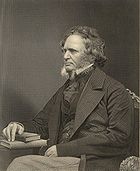 |
England | Baron Stanley Earl of Derby Earl of Derby is a title in the Peerage of England. The title was first adopted by Robert de Ferrers, 1st Earl of Derby under a creation of 1139. It continued with the Ferrers family until the 6th Earl forfeited his property toward the end of the reign of Henry III and died in 1279... until 1851 Earl of Derby Earl of Derby Earl of Derby is a title in the Peerage of England. The title was first adopted by Robert de Ferrers, 1st Earl of Derby under a creation of 1139. It continued with the Ferrers family until the 6th Earl forfeited his property toward the end of the reign of Henry III and died in 1279... from 1851 |
29 June 1846 |
27 February 1868 |
Russell John Russell, 1st Earl Russell John Russell, 1st Earl Russell, KG, GCMG, PC , known as Lord John Russell before 1861, was an English Whig and Liberal politician who served twice as Prime Minister of the United Kingdom in the mid-19th century.... 1846–52 |
|
| Derby 1852 | |||||||
| Aberdeen George Hamilton-Gordon, 4th Earl of Aberdeen George Hamilton-Gordon, 4th Earl of Aberdeen KG, KT, FRS, PC , styled Lord Haddo from 1791 to 1801, was a Scottish politician, successively a Tory, Conservative and Peelite, who served as Prime Minister of the United Kingdom from 1852 until 1855.-Early life:Born in Edinburgh on 28 January 1784, he... 1852–55 |
|||||||
| Palmerston 1855–58 | |||||||
| Derby 1858–59 | |||||||
| Palmerston 1859–65 | |||||||
| Russell John Russell, 1st Earl Russell John Russell, 1st Earl Russell, KG, GCMG, PC , known as Lord John Russell before 1861, was an English Whig and Liberal politician who served twice as Prime Minister of the United Kingdom in the mid-19th century.... 1865–66 |
|||||||
| Derby 1866–68 | |||||||
| Benjamin Disraeli 1st Earl of Beaconsfield from 1876 |
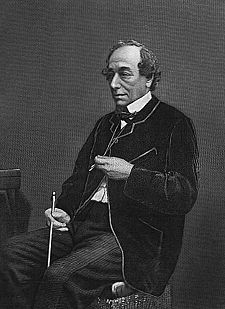 |
England | Buckinghamshire Buckinghamshire (UK Parliament constituency) Buckinghamshire is a former United Kingdom Parliamentary constituency. It was a constituency of the House of Commons of the Parliament of England then of the Parliament of Great Britain from 1707 to 1800 and of the Parliament of the United Kingdom from 1801 to 1885.Its most prominent member was... until 1876 Earl of Beaconsfield Earl of Beaconsfield The title Earl of Beaconsfield in the peerage of the United Kingdom was created in 1876 for Prime Minister Benjamin Disraeli, a favourite of Queen Victoria. Victoria favoured Disraeli's Tory policies over those of his Liberal rival, William Ewart Gladstone. Disraeli had also promoted the Royal... from 1876 |
27 February 1868 |
19 April 1881 |
Disraeli 1868 | |
| Gladstone William Ewart Gladstone William Ewart Gladstone FRS FSS was a British Liberal statesman. In a career lasting over sixty years, he served as Prime Minister four separate times , more than any other person. Gladstone was also Britain's oldest Prime Minister, 84 years old when he resigned for the last time... 1868–74 |
|||||||
| Disraeli 1874–76 Beaconsfield 1876–80 |
|||||||
| Gladstone William Ewart Gladstone William Ewart Gladstone FRS FSS was a British Liberal statesman. In a career lasting over sixty years, he served as Prime Minister four separate times , more than any other person. Gladstone was also Britain's oldest Prime Minister, 84 years old when he resigned for the last time... 1880–85 |
|||||||
| VACANT 3rd Marquess of Salisbury Robert Gascoyne-Cecil, 3rd Marquess of Salisbury Robert Arthur Talbot Gascoyne-Cecil, 3rd Marquess of Salisbury, KG, GCVO, PC , styled Lord Robert Cecil before 1865 and Viscount Cranborne from June 1865 until April 1868, was a British Conservative statesman and thrice Prime Minister, serving for a total of over 13 years... Leader of Lords Stafford Northcote Stafford Northcote, 1st Earl of Iddesleigh Stafford Henry Northcote, 1st Earl of Iddesleigh GCB, PC , known as Sir Stafford Northcote, Bt, from 1851 to 1885, was a British Conservative politician... Leader of Commons |
19 April 1881 |
1885 | |||||
| Robert Gascoyne-Cecil Robert Gascoyne-Cecil, 3rd Marquess of Salisbury Robert Arthur Talbot Gascoyne-Cecil, 3rd Marquess of Salisbury, KG, GCVO, PC , styled Lord Robert Cecil before 1865 and Viscount Cranborne from June 1865 until April 1868, was a British Conservative statesman and thrice Prime Minister, serving for a total of over 13 years... 3rd Marquess of Salisbury |
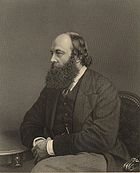 |
England | Marquess of Salisbury Marquess of Salisbury Marquess of Salisbury is a title in the Peerage of Great Britain. It was created in 1789 for the 7th Earl of Salisbury. Most of the holders of the title have been prominent in British political life over the last two centuries, particularly the 3rd Marquess, who served three times as Prime Minister... |
1885 | 11 July 1902 |
Salisbury 1885–86 | |
| Gladstone William Ewart Gladstone William Ewart Gladstone FRS FSS was a British Liberal statesman. In a career lasting over sixty years, he served as Prime Minister four separate times , more than any other person. Gladstone was also Britain's oldest Prime Minister, 84 years old when he resigned for the last time... 1886 |
|||||||
| Salisbury 1886–92 | |||||||
| Gladstone William Ewart Gladstone William Ewart Gladstone FRS FSS was a British Liberal statesman. In a career lasting over sixty years, he served as Prime Minister four separate times , more than any other person. Gladstone was also Britain's oldest Prime Minister, 84 years old when he resigned for the last time... 1892–94 |
|||||||
| Rosebery Archibald Primrose, 5th Earl of Rosebery Archibald Philip Primrose, 5th Earl of Rosebery, KG, PC was a British Liberal statesman and Prime Minister. Between the death of his father, in 1851, and the death of his grandfather, the 4th Earl, in 1868, he was known by the courtesy title of Lord Dalmeny.Rosebery was a Liberal Imperialist who... 1894–95 |
|||||||
| Salisbury 1895–1902 | |||||||
| Arthur Balfour Arthur Balfour Arthur James Balfour, 1st Earl of Balfour, KG, OM, PC, DL was a British Conservative politician and statesman... |
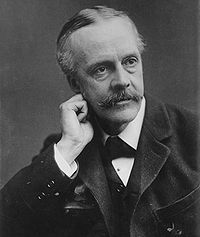 |
Scotland | Manchester East Manchester East (UK Parliament constituency) Manchester East was one of six single-member parliamentary constituencies created in 1885 by the division of the existing three-member Parliamentary Borough of Manchester... until 1906 City of London City of London (UK Parliament constituency) The City of London was a United Kingdom Parliamentary constituency. It was a constituency of the House of Commons of the Parliament of England then of the Parliament of Great Britain from 1707 to 1800 and of the Parliament of the United Kingdom from 1801 to 1950.-Boundaries and boundary... from 1906 |
11 July 1902 |
1911 | Balfour 1902–1905 | |
| C.-Bannerman Henry Campbell-Bannerman Sir Henry Campbell-Bannerman GCB was a British Liberal Party politician who served as Prime Minister of the United Kingdom from 1905 to 1908 and Leader of the Liberal Party from 1899 to 1908. He also served as Secretary of State for War twice, in the Cabinets of Gladstone and Rosebery... 1905–08 |
|||||||
| Asquith H. H. Asquith Herbert Henry Asquith, 1st Earl of Oxford and Asquith, KG, PC, KC served as the Liberal Prime Minister of the United Kingdom from 1908 to 1916... 1908–16 |
|||||||
| VACANT 5th Marquess of Lansdowne Henry Petty-FitzMaurice, 5th Marquess of Lansdowne Henry Charles Keith Petty-Fitzmaurice, 5th Marquess of Lansdowne, KG, GCSI, GCMG, GCIE, PC was a British politician and Irish peer who served successively as the fifth Governor General of Canada, Viceroy of India, Secretary of State for War, and Secretary of State for Foreign Affairs... Leader of Lords Andrew Bonar Law Leader of Commons |
1911 | 1916 | |||||
| Andrew Bonar Law |  |
New Brunswick New Brunswick New Brunswick is one of Canada's three Maritime provinces and is the only province in the federation that is constitutionally bilingual . The provincial capital is Fredericton and Saint John is the most populous city. Greater Moncton is the largest Census Metropolitan Area... |
Bootle Bootle (UK Parliament constituency) Bootle is a borough constituency represented in the House of Commons of the Parliament of the United Kingdom. It elects one Member of Parliament by the first past the post system of election. Since 1990 the MP has been Joe Benton of the Labour Party... until 1918 Glasgow Central Glasgow Central (UK Parliament constituency) Glasgow Central is a constituency of the House of Commons of the Parliament of the United Kingdom . In its current form, the constituency was first used in the general election of 2005, but there was also a Glasgow Central constituency from 1885 to 1997.- Boundaries :The Redistribution of Seats Act... from 1918 |
1916 | 1921 | Lloyd George David Lloyd George David Lloyd George, 1st Earl Lloyd-George of Dwyfor OM, PC was a British Liberal politician and statesman... 1916–22 |
|
| VACANT Lord Curzon George Curzon, 1st Marquess Curzon of Kedleston George Nathaniel Curzon, 1st Marquess Curzon of Kedleston, KG, GCSI, GCIE, PC , known as The Lord Curzon of Kedleston between 1898 and 1911 and as The Earl Curzon of Kedleston between 1911 and 1921, was a British Conservative statesman who was Viceroy of India and Foreign Secretary... Leader of Lords Austen Chamberlain Austen Chamberlain Sir Joseph Austen Chamberlain, KG was a British statesman, recipient of the Nobel Peace Prize and half-brother of Neville Chamberlain.- Early life and career :... Leader of Commons |
1921 | 23 October 1922 |
|||||
Leader of the Conservative Party 1922–present
| Portrait | Country of Birth | Constituency/Title | Took Office | Left Office | Prime Minister | ||
|---|---|---|---|---|---|---|---|
| Andrew Bonar Law |  |
New Brunswick New Brunswick New Brunswick is one of Canada's three Maritime provinces and is the only province in the federation that is constitutionally bilingual . The provincial capital is Fredericton and Saint John is the most populous city. Greater Moncton is the largest Census Metropolitan Area... |
Glasgow Central Glasgow Central (UK Parliament constituency) Glasgow Central is a constituency of the House of Commons of the Parliament of the United Kingdom . In its current form, the constituency was first used in the general election of 2005, but there was also a Glasgow Central constituency from 1885 to 1997.- Boundaries :The Redistribution of Seats Act... |
23 October 1922 |
22 May 1923 |
Bonar Law | |
| Stanley Baldwin Stanley Baldwin Stanley Baldwin, 1st Earl Baldwin of Bewdley, KG, PC was a British Conservative politician, who dominated the government in his country between the two world wars... |
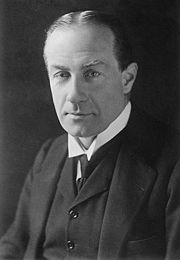 |
England | Bewdley Bewdley (UK Parliament constituency) Bewdley was the name of a constituency of the House of Commons of the Parliament of the United Kingdom from 1605 until 1950. Until 1885 it was a parliamentary borough in Worcestershire, represented by one Member of Parliament; the name was then transferred to a county constituency from 1885 until... |
22 May 1923 |
28 May 1937 |
Baldwin 1923–24 | |
| MacDonald Ramsay MacDonald James Ramsay MacDonald, PC, FRS was a British politician who was the first ever Labour Prime Minister, leading a minority government for two terms.... 1924 |
|||||||
| Baldwin 1924–29 | |||||||
| MacDonald Ramsay MacDonald James Ramsay MacDonald, PC, FRS was a British politician who was the first ever Labour Prime Minister, leading a minority government for two terms.... 1929–35 |
|||||||
| Baldwin 1935–37 | |||||||
| Neville Chamberlain Neville Chamberlain Arthur Neville Chamberlain FRS was a British Conservative politician who served as Prime Minister of the United Kingdom from May 1937 to May 1940. Chamberlain is best known for his appeasement foreign policy, and in particular for his signing of the Munich Agreement in 1938, conceding the... |
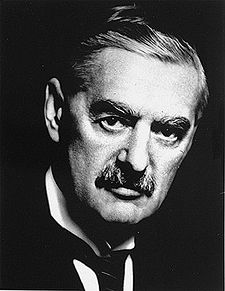 |
England | Birmingham Edgbaston | 27 May 1937 |
9 October 1940 |
Chamberlain | |
| Winston Churchill Winston Churchill Sir Winston Leonard Spencer-Churchill, was a predominantly Conservative British politician and statesman known for his leadership of the United Kingdom during the Second World War. He is widely regarded as one of the greatest wartime leaders of the century and served as Prime Minister twice... |
 |
England | Epping Epping (UK Parliament constituency) Epping was a parliamentary constituency represented in the House of Commons of the Parliament of the United Kingdom from 1885 to 1974. It elected one Member of Parliament by the first past the post system of election... until 1945 Woodford Woodford (UK Parliament constituency) Woodford was a parliamentary constituency in Essex which returned one Member of Parliament to the House of Commons of the Parliament of the United Kingdom from 1945 until it was renamed for the 1964 general election... from 1945 |
9 October 1940 |
7 April 1955 |
Churchill 1940–45 | |
| Attlee Clement Attlee Clement Richard Attlee, 1st Earl Attlee, KG, OM, CH, PC, FRS was a British Labour politician who served as the Prime Minister of the United Kingdom from 1945 to 1951, and as the Leader of the Labour Party from 1935 to 1955... 1945–51 |
|||||||
| Churchill 1951–55 | |||||||
| Anthony Eden Anthony Eden Robert Anthony Eden, 1st Earl of Avon, KG, MC, PC was a British Conservative politician, who was Prime Minister from 1955 to 1957... |
 |
England | Warwick and Leamington | 7 April 1955 |
9 January 1957 |
Eden | |
| Harold Macmillan Harold Macmillan Maurice Harold Macmillan, 1st Earl of Stockton, OM, PC was Conservative Prime Minister of the United Kingdom from 10 January 1957 to 18 October 1963.... |
 |
England | Bromley Bromley (UK Parliament constituency) Bromley is a former borough constituency in the House of Commons of the Parliament of the United Kingdom. It elected one Member of Parliament by the first past the post system of election. Its best-known MP was Harold Macmillan .... |
11 January 1957 |
19 October 1963 |
Macmillan | |
| Alec Douglas-Home Alec Douglas-Home Alexander Frederick Douglas-Home, Baron Home of the Hirsel, KT, PC , known as The Earl of Home from 1951 to 1963 and as Sir Alec Douglas-Home from 1963 to 1974, was a British Conservative politician who served as Prime Minister of the United Kingdom from October 1963 to October 1964.He is the last... |
England | Earl of Home Earl of Home The title Earl of Home was created in 1605 in the Peerage of Scotland for Alexander Home of that Ilk, who was already the 6th Lord Home.The Earl of Home holds the subsidiary titles of Lord Home , and Lord Dunglass , in the Peerage of Scotland; and Baron Douglas, of Douglas in the County of Lanark ... until 1963 Kinross and Western Perthshire Kinross and Western Perthshire (UK Parliament constituency) Kinross and Western Perthshire was a county constituency of the House of Commons of the Parliament of the United Kingdom from 1918 until 1983, representing, at any one time, a seat for one Member of Parliament , elected by the first past the post system of election.-Boundaries:The constituency was... from 1963 |
19 October 1963 |
27 July 1965 |
Douglas-Home 1963–64 | ||
| Wilson Harold Wilson James Harold Wilson, Baron Wilson of Rievaulx, KG, OBE, FRS, FSS, PC was a British Labour Member of Parliament, Leader of the Labour Party. He was twice Prime Minister of the United Kingdom during the 1960s and 1970s, winning four general elections, including a minority government after the... 1964–70 |
|||||||
| Edward Heath Edward Heath Sir Edward Richard George "Ted" Heath, KG, MBE, PC was a British Conservative politician who served as Prime Minister of the United Kingdom and as Leader of the Conservative Party .... |
 |
England | Bexley Bexley (UK Parliament constituency) Bexley was a parliamentary constituency centred on the Bexley district of south-east London. It returned one Member of Parliament to the House of Commons of the Parliament of the United Kingdom.-History:... until 1974 Sidcup Sidcup (UK Parliament constituency) Sidcup was a parliamentary constituency centred on Sidcup, an outer suburb of London in the London Borough of Bexley. It returned one Member of Parliament to the House of Commons of the Parliament of the United Kingdom.... from 1974 |
27 July 1965 |
11 February 1975 |
||
| Heath 1970–74 | |||||||
| Wilson Harold Wilson James Harold Wilson, Baron Wilson of Rievaulx, KG, OBE, FRS, FSS, PC was a British Labour Member of Parliament, Leader of the Labour Party. He was twice Prime Minister of the United Kingdom during the 1960s and 1970s, winning four general elections, including a minority government after the... 1974–76 |
|||||||
| Margaret Thatcher Margaret Thatcher Margaret Hilda Thatcher, Baroness Thatcher, was Prime Minister of the United Kingdom from 1979 to 1990... |
 |
England | Finchley Finchley (UK Parliament constituency) Finchley was a constituency represented in the House of Commons of the Parliament of the United Kingdom. It elected one Member of Parliament by the first past the post system of election; its best-known MP was Margaret Thatcher, Prime Minister from 1979 to 1990... |
11 February 1975 |
28 November 1990 |
||
| Callaghan James Callaghan Leonard James Callaghan, Baron Callaghan of Cardiff, KG, PC , was a British Labour politician, who was Prime Minister of the United Kingdom from 1976 to 1979 and Leader of the Labour Party from 1976 to 1980... 1976–79 |
|||||||
| Thatcher 1979–90 | |||||||
| John Major John Major Sir John Major, is a British Conservative politician, who served as Prime Minister of the United Kingdom and Leader of the Conservative Party from 1990–1997... |
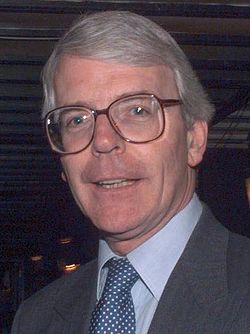 |
England | Huntingdon Huntingdon (UK Parliament constituency) Huntingdon is a county constituency represented in the House of Commons of the Parliament of the United Kingdom. It elects one Member of Parliament by the first past the post system of election.... |
28 November 1990 |
19 June 1997 |
Major | |
| William Hague William Hague William Jefferson Hague is the British Foreign Secretary and First Secretary of State. He served as Leader of the Conservative Party from June 1997 to September 2001... |
England | Richmond, Yorks Richmond (Yorks) (UK Parliament constituency) Richmond is a constituency located in North Yorkshire, which elects one Member of Parliament at least once every five years using the First-past-the-post system of voting.... |
19 June 1997 |
13 September 2001 |
Blair Tony Blair Anthony Charles Lynton Blair is a former British Labour Party politician who served as the Prime Minister of the United Kingdom from 2 May 1997 to 27 June 2007. He was the Member of Parliament for Sedgefield from 1983 to 2007 and Leader of the Labour Party from 1994 to 2007... 1997–2007 |
||
| Iain Duncan Smith Iain Duncan Smith George Iain Duncan Smith is a British Conservative politician. He is currently the Secretary of State for Work and Pensions and was previously leader of the Conservative Party from September 2001 to October 2003... |
 |
Scotland | Chingford and Woodford Green | 13 September 2001 |
6 November 2003 |
||
| Michael Howard Michael Howard Michael Howard, Baron Howard of Lympne, CH, QC, PC is a British politician, who served as the Leader of the Conservative Party and Leader of the Opposition from November 2003 to December 2005... |
 |
Wales | Folkestone and Hythe | 6 November 2003 |
6 December 2005 |
||
| David Cameron David Cameron David William Donald Cameron is the current Prime Minister of the United Kingdom, First Lord of the Treasury, Minister for the Civil Service and Leader of the Conservative Party. Cameron represents Witney as its Member of Parliament .... |
England | Witney Witney (UK Parliament constituency) Witney is a county constituency in Oxfordshire represented in the House of Commons of the Parliament of the United Kingdom. It elects one Member of Parliament by the first past the post system of election, and was created for the 1983 general election.... |
6 December 2005 |
Incumbent | |||
| Brown Gordon Brown James Gordon Brown is a British Labour Party politician who was the Prime Minister of the United Kingdom and Leader of the Labour Party from 2007 until 2010. He previously served as Chancellor of the Exchequer in the Labour Government from 1997 to 2007... 2007–2010 |
|||||||
| Cameron 2010- |

